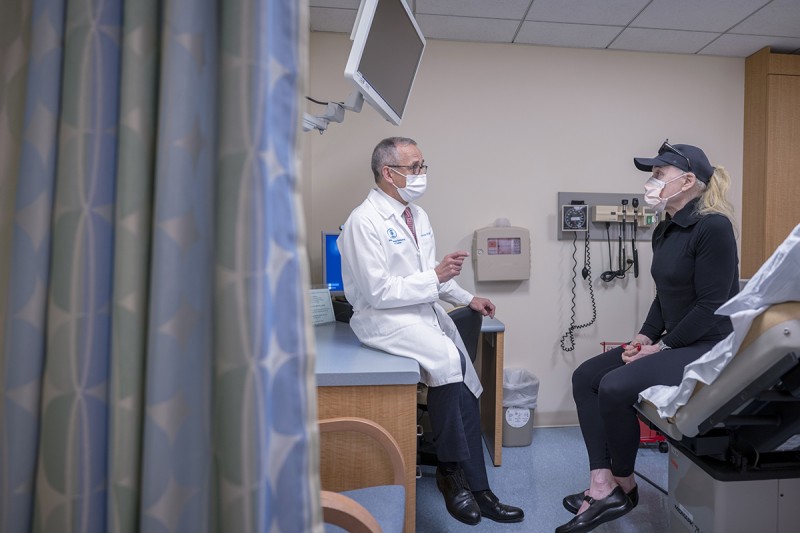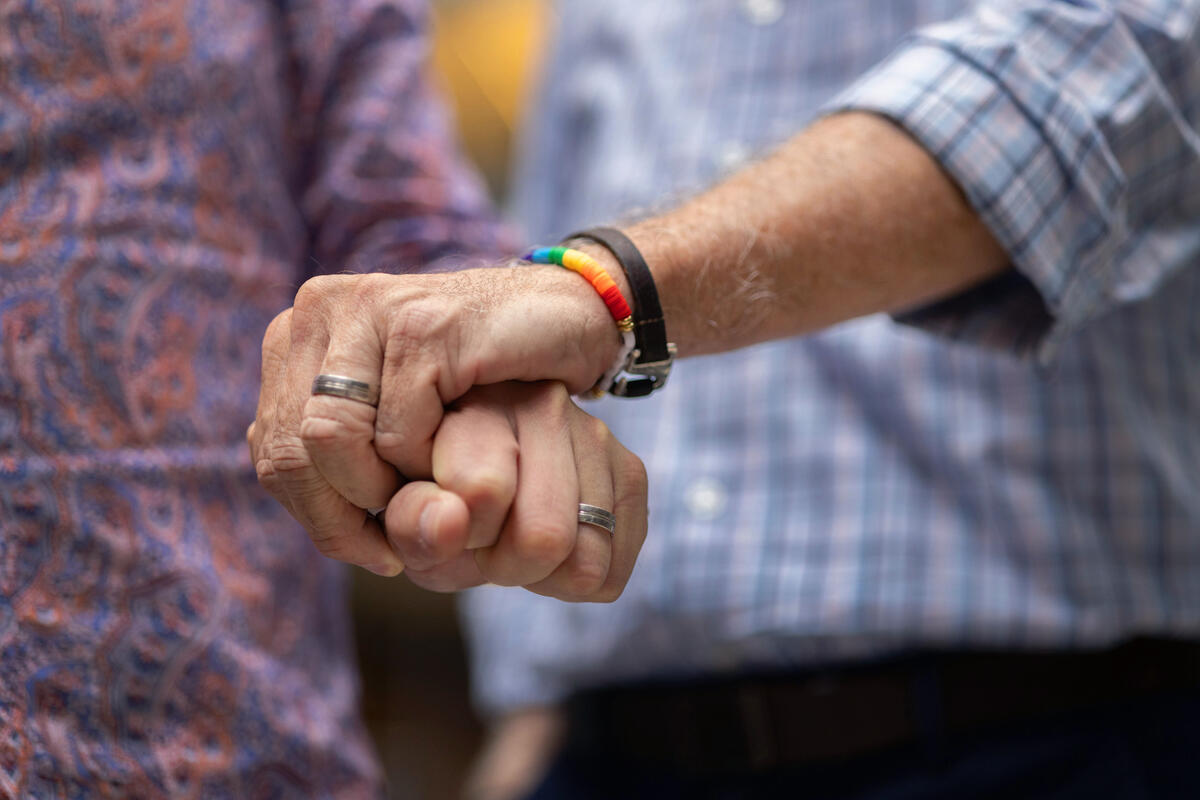
Welcome to the LGBTQI+ Cancer Care Program. We’re focused on the health of lesbian, gay, bisexual, transgender, queer, and intersex (LGBTQI+) people with cancer. Our experts in caring for LGBTQI+ people are here to guide you during and after cancer treatment.
What is the LGBTQI+ Cancer Care Program?
MSK wants people of all gender identities and sexual orientations to feel welcome and included here. You and your loved ones will be treated with respect during your care.
Even so, we know LGBTQI+ people can face challenges in healthcare settings. You may be worried about coming out to your care team. It may be hard to talk about your gender expression goals. You may face having hard talks with family and friends. Our LGBTQI+ Cancer Care Program can help.
For 10 years MSK was recognized as a national leader in LGBTQ+ Healthcare Equality. LGBTQI+ people face many healthcare challenges. This can include bad experiences, discrimination, poor access to care, and legal barriers. The program helps manage these issues and coordinate your care at MSK.
You can talk to your care team about scheduling a visit. You can also email [email protected] to schedule a visit or get more information. You can invite your caregiver or loved one to be with you during the visit.
Who is this program for?
MSK’s LGBTQI+ Cancer Care Program is available to all our LGBTQI+ patients. It’s for both people admitted to the hospital or treated as an outpatient (outside the hospital).
This program is for LGBTQI+ people getting screened or treated for cancer at MSK, or if you’re in our survivorship program. You can get the support you need. This program is where you can talk about your care goals, treatment, and any problems that come up.
We know you may be worried if it’s safe to come out to your oncologist (cancer doctor) or care team. MSK is a safe, welcoming space for you. The MSK LGBTQI+ Cancer Care Program is here to support you.
Why does MSK have an LGBTQI+ Cancer Care Program?
We know there are many barriers to cancer care for the LGBTQI+ community. This program can help you deal with challenges you may face.
Here are some examples.
Some LGBTQI+ people have trouble getting their health plan to pay for the care they need. A transgender person’s insurance may not cover a procedure or cancer screening that’s for a different gender. For example, a health plan may not cover a pap smear for a transgender man with a cervix. But anyone with a cervix can get cervical cancer.
Some healthcare providers are not familiar with the special health care and cancer care needs of LGBTQI+ people. For example, if you have HIV, you’re at a higher risk for getting some types of cancer. If a healthcare provider does not have the right training, it can delay a diagnosis or screening.
What services does MSK’s LGBTQI+ Cancer Care Program offer?
Primary care coordination
We can help coordinate your care with your primary cancer care team. We address concerns you may have. For example, you can talk to us about:
- Continuing gender affirming hormone therapy during treatment.
- Staying on PrEP (pre-exposure prophylaxis) to prevent HIV infection during cancer treatment.
- Concerns about your sexual health.
- Getting the correct dosages of chemotherapy based on sex assigned at birth.
Care consultations
Talk to us about your care goals, and anything worrying you during treatment.
- We’ll help handle issues you’re worried about.
- You can tell us about any complaints during your cancer care at MSK. Is your care team not always using your pronouns? Tell us. Are you uncomfortable about something at MSK? Tell us. We will support you.
- We can help you learn about procedures, such as chest reconstruction at MSK.
Cancer screenings
We can advise you about cancer screenings that may be right for you.
- Cancer screening is checking for cancer in people who do not have symptoms.
- Screenings can help find cancer early, when it’s easier to treat.
Genetic testing
We can help with recommendations for genetic tests, as needed.
- We can help coordinate testing if you’re at higher risk for some cancers.
- You can learn more about genetic testing and counseling at MSK.
MSK is committed to diversity, equality, and inclusion. We’re a place where people of all genders and sexual orientations feel welcome. When you learn you have cancer, you should not also worry if we will treat you with respect during your care.

We see you.
When you first come to MSK, we’ll ask you about yourself. You can tell us this information in our patient portal, MSK MyChart.
- We’ll ask you how you would like to be addressed. While we need your legal name for your medical record, we will use your chosen name whenever we can.
- We’ll also ask you your sex assigned at birth, gender, and sexual orientation.
This information can affect cancer and its treatment. Sharing this information can help us choose the best treatments for you.
- We’ll have a better idea of which cancer screenings to recommend.
- We can be sure you’re in the correct room if you’re admitted to MSK’s hospital.
- If you share your chosen name and pronouns with us, we will use them during your care.
- You can change your mind at any time. It’s no problem if you change your chosen name or pronouns more than once. Just tell us what you want us to know.
How does this information guide your care at MSK?
Here are just a few examples.
We can talk with you about your rights when you need to have your loved ones by your side. If you tell us about your care partners, we can include them when we talk with you about important care topics.
If you identify as transgender, we may take an “organ inventory.” It’s a list of your reproductive organs we can use to talk with you about cancer screenings or health concerns. We can also talk about steps to preserve your fertility, if that’s important to you.
If you’re taking the medicine PrEP, it can affect your chemotherapy. We will work with you and your primary care provider to choose the safest treatment for you.
Our experts
Several members of our LGBTQI+ Clinical Advisory Council support our patients through the LGBTQI+ Cancer Care Program.
David Jay Smith, LMHC, LGBTQI+ Senior Patient Representative
Al Asante-Facey PA-C, MBA, LGBTQI+ Clinical Patient Care Consultant
Joseph Narus, DNP, RN, GNP-BC, ANP, LGBTQI+ Clinical Patient Care Consultant
Carmen Mendez, MSN, RN, OCN, LGBTQI+ Nurse Navigator
Koshy Alexander, MD, MBA, LGBTQI+ Cancer Care Program Development
Chasity Walters, PhD, RN, LGBTQI+ Clinical Advisory Committee Executive Sponsor
Tips for how to come out to your healthcare provider
You’re in a safe space at MSK. You can come out to your cancer care team even if you have not come out to your family or other people. MSK is here to support you any way we can.
You may feel nervous talking with your care team about your sexual orientation and gender. Bring a partner, spouse, friend, or family member for support.
You can talk with your care team in person, or in a telemedicine visit. You can also message them in our patient portal.
Share what you’re comfortable sharing. You do not have to share everything all at once.
Try to plan ahead:
- Write a list of your questions.
- Try to talk before your exam, while you’re still in your own clothes.
- When you introduce yourself, you can share information about yourself and use your pronouns.
- If your spouse or partner is with you at the visit, describe that relationship when you introduce them. How you self-identify or describe your loved one tells your care team they should use those words, too.
Common questions
Frequently asked questions about MSK’s LGBTQI+ Cancer Care Program
Your visit will be with a member of our team with expertise in both cancer care and LGBTQI+ health.
We will not bill your health insurance plan for this visit.
If you would like an interpreter to join your telemedicine visit, ask an office coordinator or care coordinator.
Most often, you can get care from the comfort of your home with a telemedicine visit.
If you’re admitted to the hospital, you can schedule a consult in the hospital.
You can schedule an appointment any time during your cancer treatment at MSK.
You can ask your care team to refer you to the LGBTQI+ Cancer Care Program. You will hear from us about scheduling your visit.
If you’re admitted to MSK’s hospital, we will visit you there.
We’ll let you know how to get ready for the consult visit.
Yes, we do need your legal name so we can confirm your health insurance. That lets us make sure your health plan covers your care. We also need your legal name to follow MSK’s rules for identifying our patients. This is important for your safety.
When you first come to MSK, we’ll ask you about yourself. We’ll ask you how you would like to be addressed. While we need your legal name for your health record, we’ll use your chosen name whenever we can.
Here are some good resources for you to read.
LGBTQI+ Cancer Support Resources
This information describes support resources available to LGBTQI+ patients and their loved ones.
Why You Need a Health Care Agent: Information for the LGBTQI Community
This information describes what you can do to make sure you get the healthcare you would want if something happened to you.
A Guide for Adolescents and Young Adults (AYAs): Coming Out to Your Care Team
This information has tips to help lesbian, gay, bisexual, transgender, queer, and intersex (LGBTQI+) patients come out to their care team.
Here are resources about possible health issues and risks to be aware of:
We’re experts in helping you manage side effects of treatment. We focus on all parts of cancer care, not just treating the disease. Our experts in supportive care can help you cope with treatment side effects. This includes pain, nausea (feeling like throwing up), and fatigue (feeling very tired).
Controlling pain has always been a very important part of how we treat cancer. Your MSK care team has experts in managing the kind of pain that’s common during and after cancer treatment.
We have ways to help manage nausea during chemotherapy. We have a team of experts who manage the symptoms and side effects of cancer treatment.
Our Integrative Medicine Service offers acupuncture, meditation, massage therapy, yoga, and exercise. MSK has a long history of researching how integrative therapies are safe and helpful for people with cancer.
Chemotherapy and other cancer therapies can cause side effects. You may want support to cope with chronic pain, fatigue, nerve problems, nausea, and stress.
Without the use of prescription drugs, integrative therapies can help improve and control these lasting side effects of cancer treatments.
MSK is a major research institution. During your cancer treatment, your care team may ask if you want to join a clinical trial.
Clinical trials are research studies that test new treatments, procedures, or devices to see how well they work. They are an important part of helping to prevent, treat, and cure cancer. Almost every cancer treatment given to patients was first tested during a clinical trial.
People who join an MSK clinical trial may get the latest cancer treatment available, sometimes years before it’s offered anywhere else.

